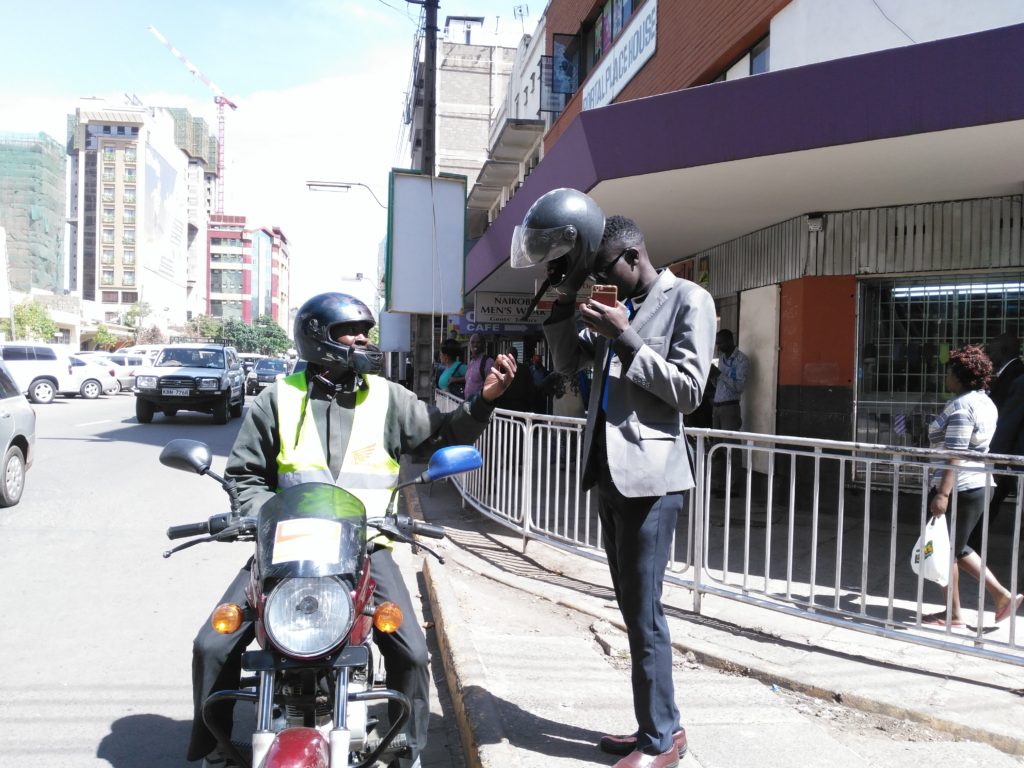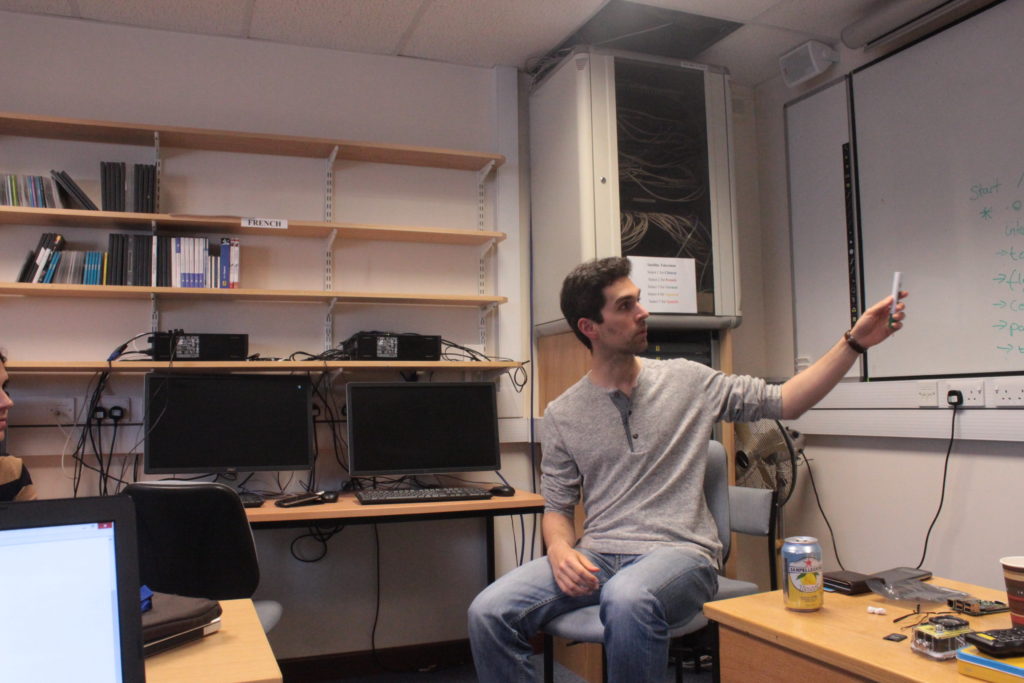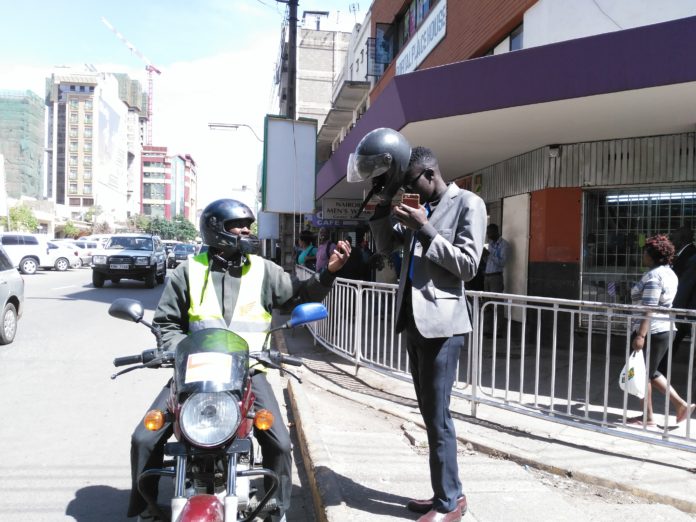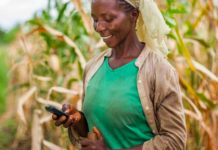By Lilian Museka
The informal business landscape in Sub -Saharan Africa holds big businesses accounting for up to 41 percent of gross domestic product according to International Labour Organization (ILO)
In Kenya, the Economic Survey by the Kenya National Bureau of Statistics (KNBS) states that the industry represents 83.1 percent of the country’s total labour force
Most of the businesses in the industry are semi-organized, unregulated and use low or simple technologies for their operations. They include small scale traders, crafts people and entrepreneurs.
Despite the sector contributing greatly to the growth of the economy in the country, one of the greatest challenges they face is getting clients. They always have feast time or a famine time on daily basis depending on the season. Lack of networks that sustain constant flow of businesses has made them lose out on many opportunities.

Mapped service provider, rider offering his service to a client in the streets of Nairobi
“If they can be facilitated to find their next customer, it will work as an advantage to help them get to abundance of job opportunities. The small businesses operators always spend up to 80% of their time idle waiting for the next job. Lack of legal frameworks and formal references, with fraudulent practices on both sides has led to distrust between customers and service providers. This requires trust prior to engaging in a job opportunity which is difficult to achieve by new entrants, and further time and cost intensive. This is why we introduced Netwookie ,” says Mr. Max Bock, Founder and Chief Executive Officer
Netwookie is a social impact platform showing shared contacts to facilitate trust between clients and professionals specifically in the service industry, effectively digitalizing word-of-mouth referrals. Established in 2015, it pioneered trust algorithms that enable professionals to attract more customers and generate more income per day. Today, the team is based in Kenya and France.
The platform’s operation involves a client searching for a service with listed providers and their contacts. He then presses call to get in touch with the provider who arranges for the service, and gets paid directly by the client or via Netwookie interface.
The platform has two types of users; clients and professionals, with the same user being able to access services whilst offering their own. Users can see instantly how they are connected with providers in absence of any existing web profile such as Facebook or LinkedIn. The solution adapts the local business practices by showcasing common contacts to facilitate trust and offers an instant call function to get the service people, thereby digitizing word of mouth.
Once subscribed, for every connection between service provider and client, Max says they charge a fixed fee depending on location and service type. Providers buy credit for receiving calls using MPesa, just as they would for buying internet bundles or other mobile credit. Once the credit is depleted, the provider receives a notification to top-up to continue receiving clients through Netwookie.

The platform was launched in early 2017 in Nairobi. The first month saw it grow to 500 users with service providers who included Taxi drivers, cooks, motor bike drivers, electricians, IT consultants, cleaners, plumbers and tailors. Today the platform has mapped 135,000 individuals and actively connected 500 users on a daily basis with a fixed fee of $ 0.20 per exchange (equivalent to Ksh. 20).
He adds that every day the lives of 680 million informal workers are affected and the number of providers is growing daily. “The informal sector is generating 40% of the African continent’s GDP, equivalent to €1 trillion every year, but is losing €27 trillion due to missed opportunities. We want to change this fundamentally to double people’s incomes and livelihoods.” Says Max.
Asked what led to the formation of Netwookie, the engineering doctorate holder revisits that whilst working as a volunteer in Brazil in the favelas of Sao Paulo, he came across two people in the midst of dirt and trash taking apart a VW Beetle and connecting the radio to the main power cables running above to have music at their work place whilst waiting for clients. “This frugal ingenuity made me realise that the informal economy is composed of people with remarkable talents yet with no opportunities for them and their families to live a better life.” He says.
After his PhD, he accepted a Post-Doc position to investigate how to change the dynamic in a sustainable way. He collaborated with UN Habitat in designing a community centre in Kenya’s oldest slum, Mathare, with the full participation of the community.
“For the construction we were faced with the challenge of not knowing to what extend we could recruit from within the community. I noticed the following: workers don’t have a website or store, but they come with recommendations from others, forming that basic trust needed to do business. I envisioned a book-keeper approach would prove invaluable: noting down skills and needs and where possible matching the two. Unlike surveys, the shared information would find direct economic use and completely disrupt the business landscape of 680 million workers in Africa. This marked the beginning of Netwookie,” he adds.
Max says that Netwookie has placed a strong emphasis on communities in Nairobi, where they conduct studies with focus groups, actively design and run marketing campaigns, and guide users throughout their customer journey with Netwookie.
“Our team gathers critical customer feedback to shape and advance the product through in person interactions, calls, and direct and social media messaging. Through these activities we have reached 10,000s of Kenyans, drawn them to jointly enact our social mission of empowering youth to become successful entrepreneurs, overcome gender biases, and further the income of the ones struggling to make a living. It is also the centre for all regional partnerships, including with local authorities, start-ups, and grant organisations; and serves as a hub for East Africa to bring Netwookie to neighbouring cities and countries,” he says
Netwookie however faces the challenge of shortening the feedback loop between feature requests, their technical implementation, testing and debugging, and returning to the user with the new solution. He hopes for partnership opportunities with technological firms to help sort this challenge.
O the vision of Netwookie, Max states that “Our ambition is to create transparency across the informal sector to help lift individuals out of poverty. We have shown that by connecting professionals with the digital economy, it is possible to increase their number of customers and double incomes. This is just the beginning; transparency enables other organisations to offer financial, health care, and many other services, that at the moment are beyond reach for informal workers. In partnership with businesses and charitable organisations, we seek to enrich the livelihoods of informal workers long-term.”














